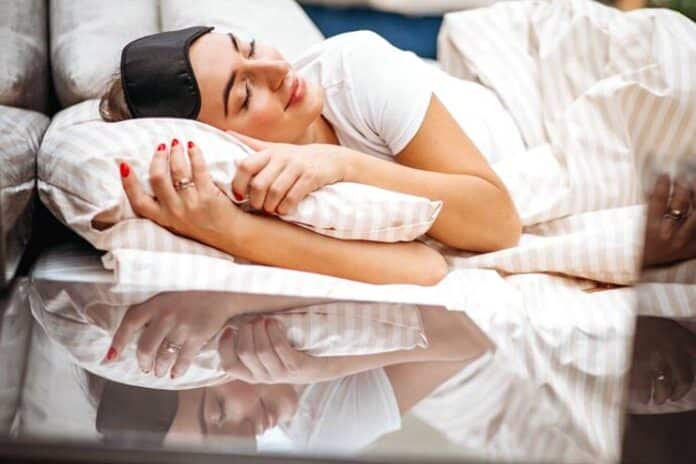Affiliate Disclaimer
Some links in this article are affiliate links. We may earn a small commission if you make a purchase through these links, at no extra cost to you. We only recommend products we find useful to our readersResting the body isn’t the only benefit of a restful night’s sleep; glowing skin and general well-being also greatly benefit. Imagine waking with a radiant complexion from getting a good night’s sleep. Occasionally, more than having a comfortable mattress and pillowcase alone is required to provide the optimal slumber our bodies need. Having a nightly ritual seems like a far-off fantasy because of our busy lifestyles.
According to study after study, adults who don’t get enough sleep are associated with several health problems. Beneath the surface, it reveals the science of how sleep affects the skin’s ability to repair damaged cells.
The article examines the mutually beneficial relationship between sleep and skin radiance as we delve into 10 Tips for Glowing Skin and Restful Nights.
Understanding the Sleep-Skin Connection
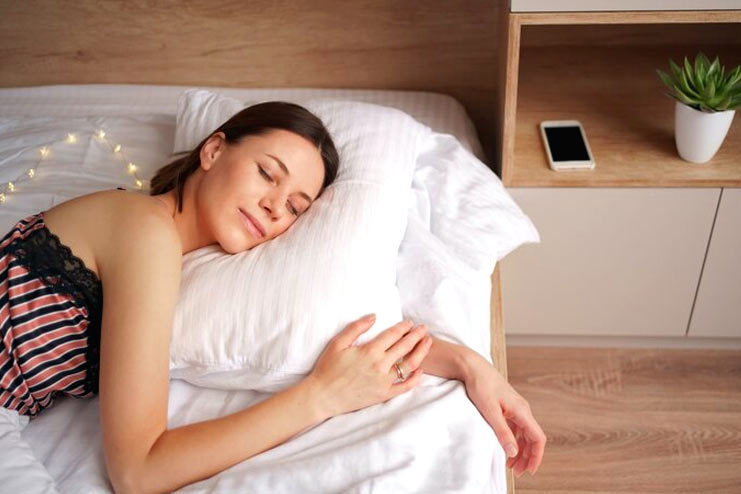
Examining the complex relationship between skin health and sleep reveals an intriguing interaction between biological systems. The body, including the brain, immune system, metabolism, and skin, depends heavily on sleep for upkeep and repair. A study has shown that skin cells renew more quickly at night. Skin cells regenerate to make collagen, the protein that helps maintain the volume and flexibility of our skin. Our sleep also increases the blood flow to skin, providing it with nutrients it needs to repair following a day in the sun.
The body repairs and regenerates its cells as we sleep, a process essential to our skin’s health. Deep sleep stages are when skin cells abused by everyday living regenerate. Sleep is a natural defence against ageing symptoms, including drooping and wrinkles. When we sleep, skin produces new collagen. Lack of sleep can cause our skin to appear dry, naturally highlighting fine lines, particularly in the thin skin beneath the eyes.
Establishing a Consistent Sleep Schedule
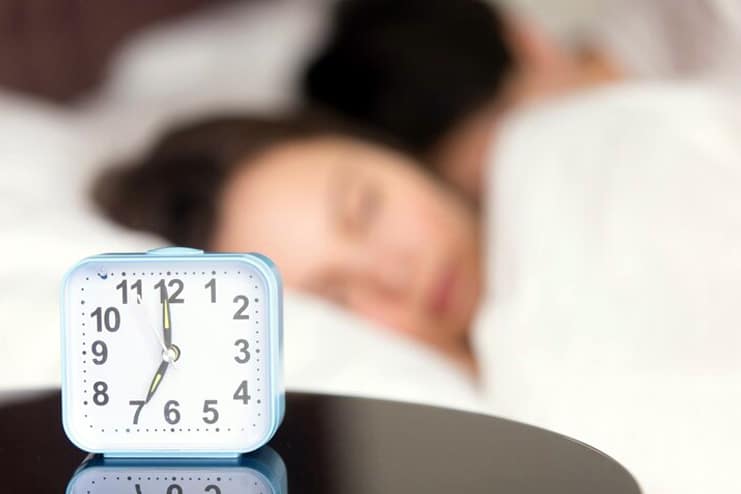
Setting up a regular sleep pattern is one often-overlooked yet effective tactic in pursuing glowing skin. Studies indicate that adhering to a typical sleep pattern can improve the quality of our sleep. Exercise is also linked to lower risk of heart disease and a healthier body composition. Maintaining a regular sleep pattern aids in preserving the circadian rhythm, or internal clock, of the body.
Give yourself a maximum of eight hours to rest. A healthy adult should get at least seven hours of sleep per night. Most people must spend eight hours in bed to get a good night’s sleep. Every day, including weekends, set a consistent time to go to bed and wake up. Maintaining consistency helps your body’s circadian rhythm. After going to bed, if you haven’t fallen asleep after around twenty minutes, get out of your bedroom and do something soothing. Read a book or put on some calming music. When you are exhausted, return to bed. Repeat as necessary, but don’t alter your bedtime or wake-up time.
Creating a Relaxing Bedtime Ritual
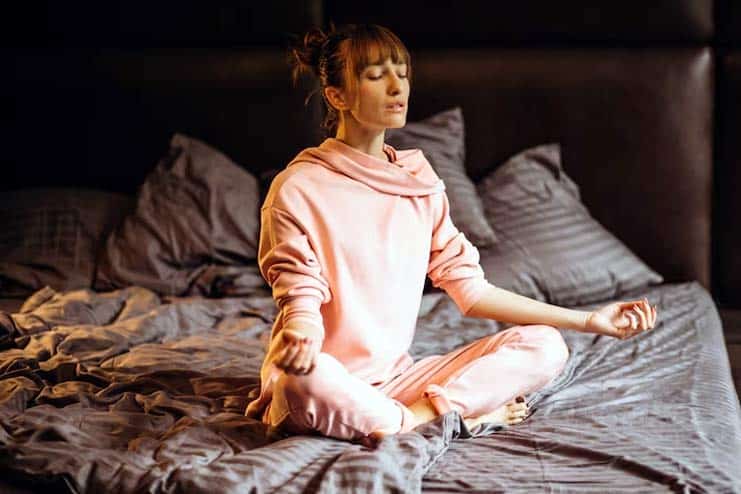
Maintaining a healthy balance and promoting good skin health can be facilitated by prioritizing excellent sleep and implementing stress-reduction strategies like meditation and relaxation exercises. According to research, sleep deprivation weakens the immune system, which may affect the collagen’s strength and quality. Wrinkles may arise from the skin’s declining health as a result. Crow’s feet, frown lines, and wrinkles are linked to sleep deprivation.
Including peaceful night-time routines can have profound effects. A bedtime ritual is a routine you follow every day in the 30 to 60 minutes leading up to bedtime. Think about doing deep breathing exercises, light meditation, or taking a warm, relaxing bath that has been scented with calming essential oils. Taking part in a thoughtful wind-down practice tells the body it’s time to go from the day’s stresses to a calm condition.
Related Articles: How to Get Rid of Loose Skin
Choosing the Right Sleep Environment
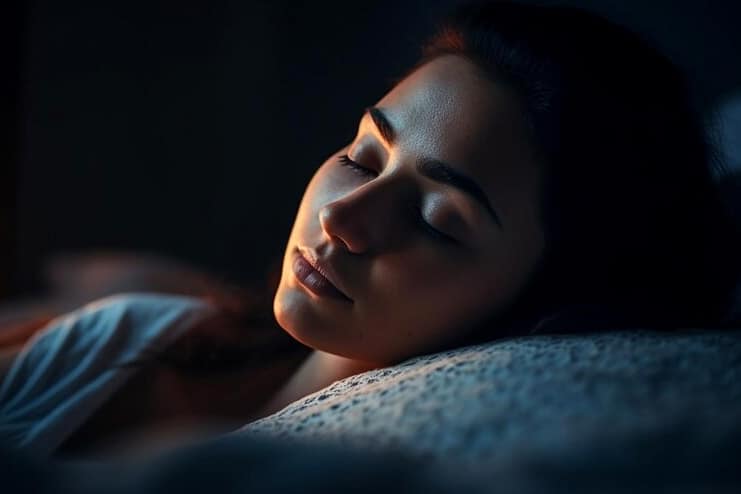
The best possible environment is essential for good sleep and healthy skin. The environment in which we sleep significantly impacts how deeply and well we sleep. The optimum atmosphere for sleeping is peaceful and free of light and noise. Additionally, it’s said to be optimal to sleep in a cold environment with fresh scents and clean bedding. One of the main things that affects how well you sleep is the atmosphere in which you sleep.
Setting up your bedroom correctly is essential for regular sleep. A crucial component of sleep hygiene is setting up a bedroom that encourages sleeping and remains asleep, which can lead to restful sleep every night. Both practical setup—including lighting, music, and scent—and visual design are essential in creating a peaceful sleeping environment. You may complete the perfect bedroom for the best possible sleep by considering these aspects of your sleep environment.
Embracing Technology for Sleep Aid
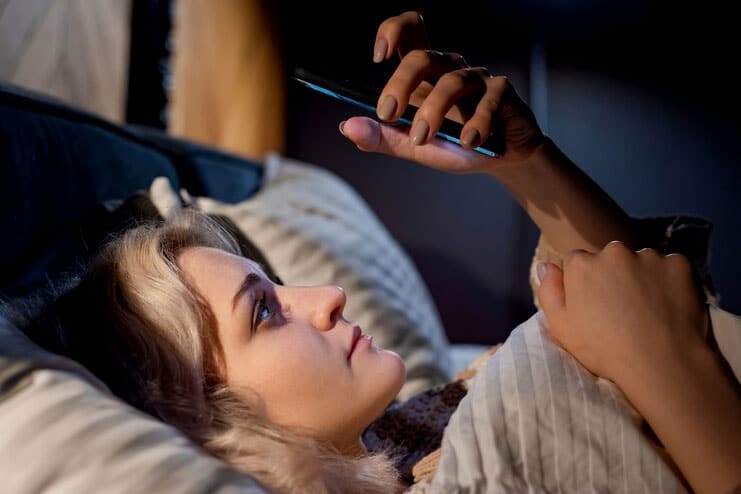
Technology can be a strong ally in improving sleep quality in the digital age. The field of sleep technology is developing, providing cutting-edge answers to typical sleep problems. Additionally, there are several benefits to sleep technology. Some apps that can help you fall asleep more easily include tracking snoring using sound recordings, adjusting your sleep schedule when travelling to prevent jet lag, and providing guided meditations.
Even while getting a good night’s sleep is crucial for maintaining general health, from bolstering the body’s reaction to stress to preserving the integrity of the immune system, it can occasionally be easier said than done. Thankfully, many tools, like sleep applications, are available to assist those who have trouble falling asleep. These apps include peaceful music, meditation, and even sleep-tracking capabilities to assist users in falling asleep, staying asleep, and maintaining healthy sleep patterns. Better Sleep, sleepiest, shuteye: sleep tracker, breathe, etc., are a few services that use technology to help you achieve peaceful sleep.
The Impact of Nutrition on Sleep Quality
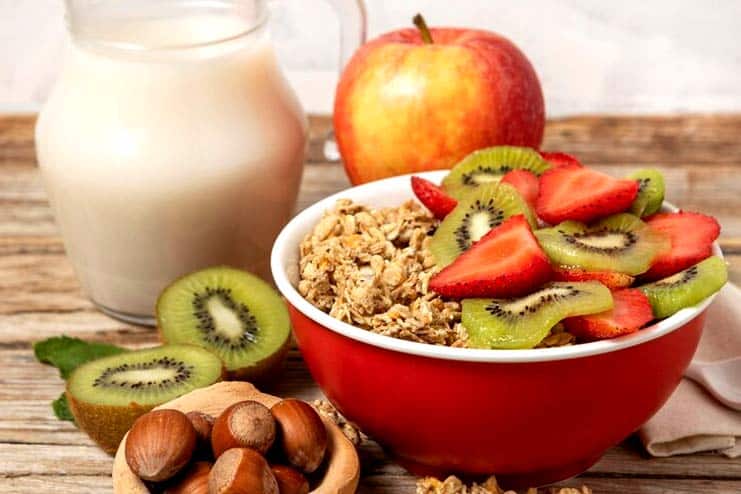
The complex relationship between diet and sleep patterns emphasizes how crucial careful food selection is to general health. Studies in the scientific community have shown that specific diets can majorly affect sleep patterns, affecting both the quantity and quality of a night’s sleep. Recognizing this link promotes healthy sleep patterns and can help achieve a complexion that exudes energy and health. Eating right before bed can disturb sleep, and caffeine is well known for making it harder to fall asleep. It may be easier to obtain enough sleep if you eat a diet excessively high in fat or calories.
Consider including items that promote good sleep in your diet to improve the quality of your sleep. Due to their high nutrient content, some meals and beverages can help you sleep better. Foods that promote relaxation and sleep include kiwi, cherries, milk, nuts, fatty fish, and rice. It is imperative to refrain from consuming coffee, alcohol, and large meals just before bed to preserve sound sleep habits.
Mind-Body Techniques for Sleep

Mind-body practices can be a game-changer for regenerated skin and comfortable sleep. With roots in antiquity, mindfulness techniques provide a modern approach to the problem of getting good, deep sleep. Mindfulness meditation is a valuable technique for applying mindfulness to sleep aids. This approach involves paying attention to your thoughts and sensations while primarily focusing on your breathing. Avoid pondering about the future or your prior experiences while doing this. Mindfulness meditation aims to induce a state of relaxation and divert your attention from your everyday problems.
There is no doubt that the evening is the time to decompress and let go of the day’s worries, but there is a distinction between unwinding and engaging in unhealthy night-time behaviours. Find a quiet area to practise guided imagery as you prepare for bed and picture a serene location or situation. Before going to bed, try taking time to decompress, eat a healthy dinner, read a book, practice gratitude, etc., to help you relax and unwind.
Exercise and Its Role in Sleep

Exercise and sleep have a symbiotic relationship widely recognized as a fundamental component of overall well-being. Frequent physical activity has a substantial positive impact on sleep quality in addition to improving physical health. Charlene Gamaldo, M.D., medical director of the Johns Hopkins Center for Sleep at Howard County General Hospital, states that there is “solid evidence saying that exercise does help you fall asleep more quickly and improves sleep quality” based on the currently available research.
For the best benefits, consider including aerobic exercises like jogging, cycling, or fast walking. These activities raise body temperature and heart rate, facilitating more profound, more restful sleep. The timing is crucial; finish your workout a few hours or earlier than usual to give your body time to calm down.
Consistently incorporating exercise into your lifestyle promotes general health and a healthy sleep environment for your skin and body.
Sleep Hygiene Practices for Glowing Skin
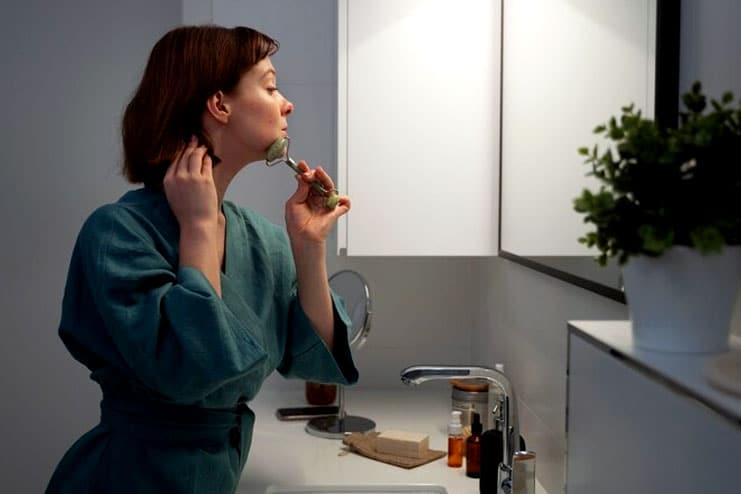
Beyond using serums and lotions, the key to glowing skin lies in developing sleep hygiene habits that promote sound sleep and healthy skin. Developing a conscious approach to your evening habits can make all the difference regarding having a glowing complexion. The term “sleep hygiene” describes your sleeping habits and surroundings. Poor sleep hygiene can severely impact the quantity and quality of sleep. Establishing a rigid sleep schedule, adhering to a nighttime ritual, developing wholesome habits, and making your bedroom the most conducive to sleep are all excellent sleep hygiene.
Nothing is more reviving than washing away the pollutants that enter your face daily. Although it may seem like a chore, your skin will thank you for it, and you can easily incorporate it into a basic nighttime skincare routine! This two-step face-washing method begins with a cleanser (often oil-based) to remove debris and makeup, then a second wash to thoroughly clean the skin.
Troubleshooting Common Sleep Issues
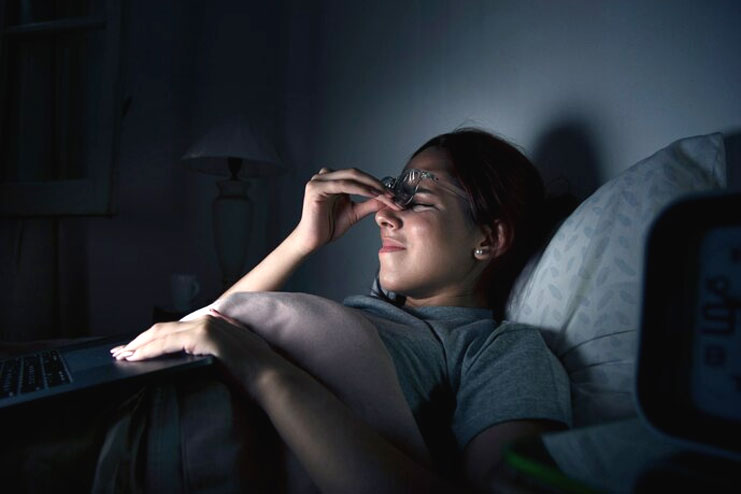
Recognizing and treating common sleep issues is essential to promote healthy sleep patterns and achieve glowing skin. Numerous variables, such as stress and environmental disturbances, can affect the quality of our sleep and, in turn, the condition of our skin. Many people suffer from sleep-related problems. A person with insomnia will be unable to fall asleep or stay asleep. It might also manifest as an inability to fall asleep after waking up many hours earlier. Incorporating relaxation methods like guided meditation or deep breathing into your bedtime routine may be beneficial. Stress-inducing tension can be reduced by writing or engaging in mindful techniques to address stress.
If light or noise from the surroundings keeps you awake, consider getting blackout curtains or earplugs to make your sleeping environment more comfortable. Electronic devices like computers, tablets, and phones emit blue light that disrupts sleep, so avoid using them at least an hour before bed. If you are struggling to fall asleep, do try reading a book, listening to calming music or podcasts, or practicing sleep meditation.
Conclusion
The path to glowing skin and comfortable sleep starts with small but significant adjustments. A summary of the 10 suggestions, ranging from creating a regular sleep regimen to utilising technology and mind-body practices, might act as a road map for getting the beauty sleep you deserve. Now that you have this understanding, it’s time to work.
Include these suggestions into your evening routine to create habits that will improve the quality of your sleep and nurture your skin. Accepting these habits gives you a more radiant complexion and a revitalised well-being. Glorious mornings and dreamy dreams are in store.
Recommended Articles:
- Honey for Glowing Skin – 11 Tricks To Bring Out the Inner Glow
- Effects of Alcohol on Skin – 7 Alarming Side Effects
Reference
https://www.samhealth.org/about-samaritan/news-search/2019/05/29/importance-of-sleep-to-your-appearance-and-skin#:~:text=Sleep%20Protects%20Skin&text=%E2%80%9CThe%20ability%20of%20skin%20to,affect%20the%20way%20you%20look.%E2%80%9D
https://www.rafflesmedicalgroup.com/health-resources/health-articles/6-beauty-benefits-of-sleep/#:~:text=Apart%20from%20applying%20sun%20screen,since%20the%20skin%20is%20thin.
https://www.sleep.com/sleep-health/sleep-schedule#:~:text=Research%20suggests%20that%20maintaining%20a,lower%20risk%20of%20heart%20disease.
https://www.mayoclinic.org/healthy-lifestyle/adult-health/in-depth/sleep/art-20048379#:~:text=Stick%20to%20a%20sleep%20schedule&text=Go%20to%20bed%20and%20get,or%20listen%20to%20soothing%20music.
https://arizonaderm.com/how-sleep-impacts-your-skin-health/#:~:text=Prioritizing%20quality%20sleep%20and%20adopting,and%20promote%20optimal%20skin%20health.
https://sleepeducation.org/how-technology-helping-hurting-sleep/#:~:text=There%20are%20plenty%20of%20upsides,sleep%2C%20to%20name%20a%20few.
https://www.forbes.com/health/wellness/best-sleep-apps/
https://www.sleepfoundation.org/physical-health/diet-exercise-sleep#:~:text=Caffeine%20is%20notorious%20for%20making,harder%20to%20get%20enough%20sleep
https://www.webmd.com/balance/features/how-to-fall-asleep-with-mindfulness-techniques
https://www.hopkinsmedicine.org/health/wellness-and-prevention/exercising-for-better-sleep#:~:text=Based%20on%20available%20studies%2C%20%E2%80%9CWe,at%20Howard%20County%20General%20Hospital.
https://www.cdc.gov/sleep/about_sleep/key_disorders.html
https://www.nhs.uk/every-mind-matters/mental-wellbeing-tips/how-to-fall-asleep-faster-and-sleep-better/#:~:text=Relax%2C%20unwind%20and%20try%20sleep%20meditation,-Remember%2C%20your%20sleep&text=Avoid%20electronic%20devices%20at%20least,if%20you%20have%20trouble%20sleeping.
In this Article













